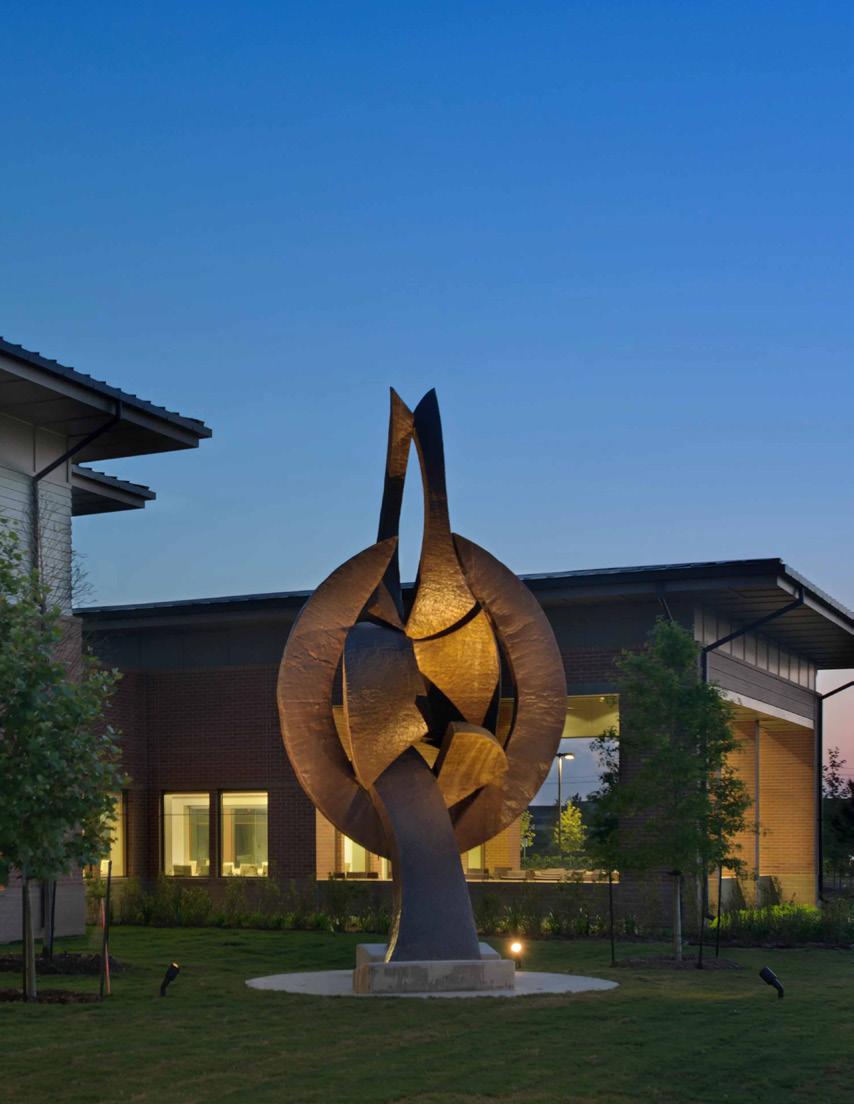A Place of Healing, A Path to Hope.
2024 IMPACT REPORT


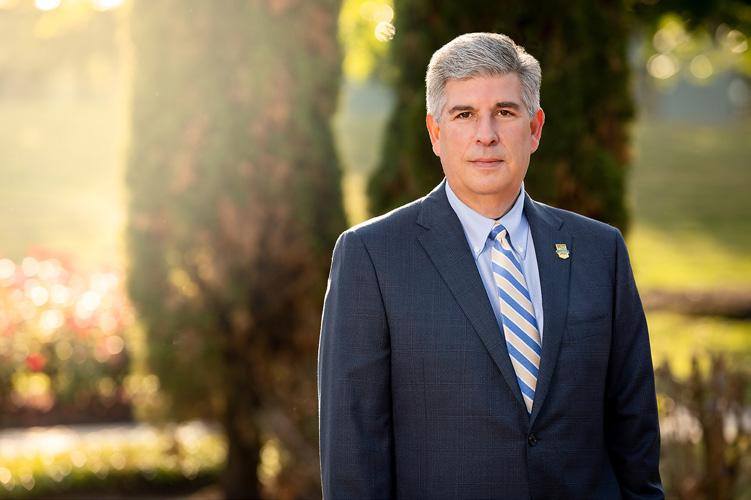

2024 IMPACT REPORT



Each day at The Menninger Clinic, we witness the power of healing—not just through clinical excellence, but through the unwavering compassion and generosity of people like you.
This year’s Annual Impact Report reflects more than just numbers. It tells the story of transformation: of individuals reclaiming their lives, families finding hope, and a community growing stronger through shared purpose. Behind every success are our dedicated clinicians and staff—and the donors and partners who believe in our mission.
Philanthropy continues to be vital to advancing mental health care, research, and education. Your support has expanded access to lifesaving treatment, and fueled groundbreaking studies, as well as the tools we use to aid people in their health care journey—with dignity, empathy, and evidence-based care.
As we look ahead, we are energized by new possibilities and grounded by a singular truth: healing happens here, because of you.
Thank you for standing with us. Together, we are changing lives—and the future of mental health.
Armando E. Colombo President and Chief Executive Officer The Menninger Clinic
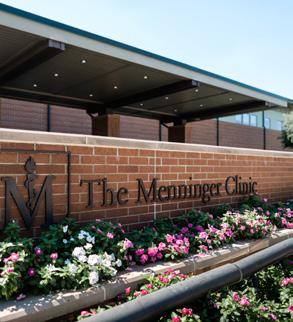
6.7K Outpatient Sessions
854 Inpatient Admissions
32 Published Scholarly Articles
30K+ Mind Dive Podcast Downloads
110 Patients Received Financial Assistance
81 Clinical Professionals Trained
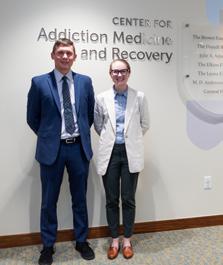
213 Gathering Place Members
1.4K Hours of Community Education
$2M in Charitable Donations to Fund Research, Education and Community Initiatives

In 2024, The Menninger Clinic advanced its mission to make high-quality mental health care more accessible for those who need it most. With the support of generous philanthropic partners, we are shaping a future where mental health is treated with the urgency and dignity it deserves. As demand continues to grow, Menninger remains committed to meeting people
staff involved in summer camp and after school programs and we are partnering with Lamar High School to implement an initiative to help identify issues early on and ensure that students receive timely support. Research indicates that integrating mental health services within schools can improve safety, attendance, academic performance, and graduation rates. Launching an evidence-based Early Adolescent Mental Health Screening Initiative—a scalable program designed to identify emerging mental health needs in high school youth, promote early intervention, and reduce longterm suffering is a first step to address the rising youth mental health crisis by equipping schools to act early, effectively, and compassionately.
We are thrilled to introduce new mental health support options within our expanded care continuum. This includes the recently opened Center for Addiction Medicine and Recovery located on the second floor of the Outpatient Service Center. The center provides a range of services, including crisis stabilization and medication management, to address the increasing demand for effective treatment in substance use and behavioral addictions within our Bridge Residential Program.

Additionally, the center acts as a training facility for professionals and as a research hub.
We also launched a new Stabilization Program to assist adults in crisis in finding immediate support when they need it most. This program offers a safe and comfortable care environment with private rooms and on-site psychiatrists and nursing staff.
Our Adolescent Day Treatment Program provides effective therapies to young individuals in crisis while
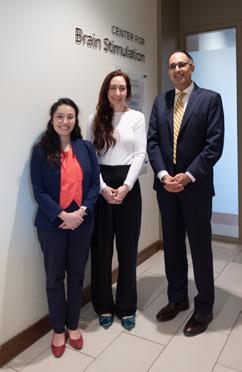
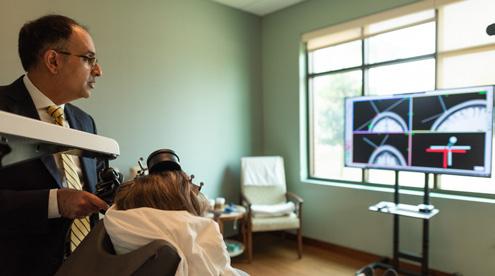
enabling them to return home each evening. This family-centered approach helps to reduce disruptions while thoughtfully addressing significant challenges such as treatment-resistant depression and suicidal thoughts.
In 2024, we expanded our Menninger community integration program to serve two additional counties – Fort Bend and Montgomery – in addition to Harris County. The program is the only private team in Texas that provides community treatment for psychiatric needs, and it now offers complete support for new parents during and after pregnancy, helping expectant parents in their homes. Menninger 360 is also the first intensive program for perinatal mental health in Texas that has been vetted and approved for a listing by Postpartum Support International.
The Center for Brain Stimulation has implemented groundbreaking Rapid Targeted TMS therapy (RT TMS), which combines TMS with functional MRI (fMRI) technology, allowing us to target specific brain areas that need help. The treatment focuses on precise patient positioning and utilizes the latest neuroimaging techniques to target depression more effectively. RT TMS therapy consists of 10-minute TMS sessions every hour for 10 hours over five days, and patients can achieve
remission in just five days, with longlasting positive effects. Menninger researchers and clinicians are also working to expand their understanding of brain neurotransmitters and neural circuits to predict treatment responses better.
These accomplishments profoundly enhance the mental health of our community, thanks to the remarkable support from individuals like you. We look forward to seeing where our ongoing collaboration takes us in the years ahead.
Every dollar invested in mental health yields a $4 return in better health and ability to work. - WHO 2016
At The Menninger Clinic, we believe that access to world-class mental health care should never be limited by financial constraints. While the acceptance of private insurance has significantly broadened access to our services, reimbursement rates often fall short of covering the full cost of the intensive, evidence-based care we provide.
On average, insurance will cover only 1.5 to 2 weeks of treatment, while optimal clinical outcomes require 4 to 6 weeks of continuous care. This gap can leave patients, especially those most vulnerable, unable to complete their healing journey.
The Charitable Assistance Fund is critical to bridge this gap, ensuring that all patients, regardless of their financial situation, receive the comprehensive care they need for long-term recovery.
Since 2020, 318 patients have received charitable assistance totaling $9.4M
made possible in part by the generosity of our donors.
Menninger-trained professionals carry forward a legacy of compassionate, expert mental health care, making a meaningful difference in communities nationwide.
As mental health needs continue to rise across the country, the demand for skilled, compassionate professionals has never been greater. The Menninger Clinic is meeting this need by training the next generation of clinicians and equipping them with both technical expertise and a deep respect for the individuals they serve.
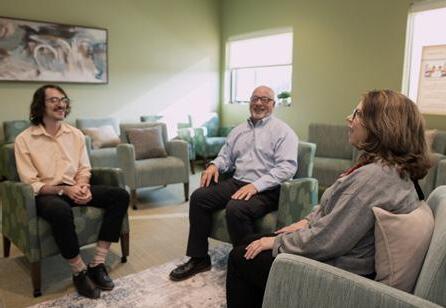
Last year, we trained 81 nationally respected residency, fellowship, internship, and post-doctoral trainees across:
General, child, and adolescent psychiatry
Addiction psychiatry
Clinical psychology
Clinical social work
Nursing
Counseling
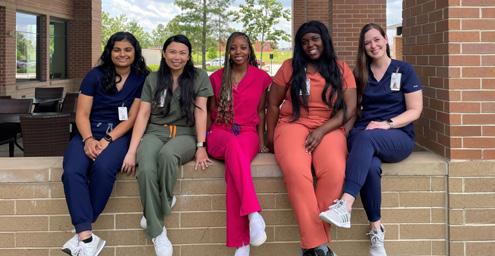
Here, three recent trainees reflect on the impact of Menninger’s training programs on their professional development:
Jenna completed Menninger’s one-year postgraduate fellowship in clinical social work and now serves as an associate clinician on Menninger’s Community Collaborations team. Transitioning from a prior career in the nonprofit sector, she says Menninger gave her the clinical foundation and confidence she lacked after graduate school.
“Menninger’s training program developed my clinical mind,” Jenna says. “I started out feeling like I knew nothing, and by the end, I was confident and prepared. The multidisciplinary approach was critical—I learned to value perspectives from psychiatry, nursing, and social work alike.”
In her current role, Jenna serves as a liaison to several youth-serving organizations, including DePelchin Children’s Center, the Greater Houston YMCA, and Houston ISD’s Lamar High School.
After completing both an internship and fellowship in clinical psychology at Menninger, Dr. Orme now practices as a psychologist at Houston Methodist Hospital. He credits Menninger with instilling not only clinical rigor but also a value-based approach to care.

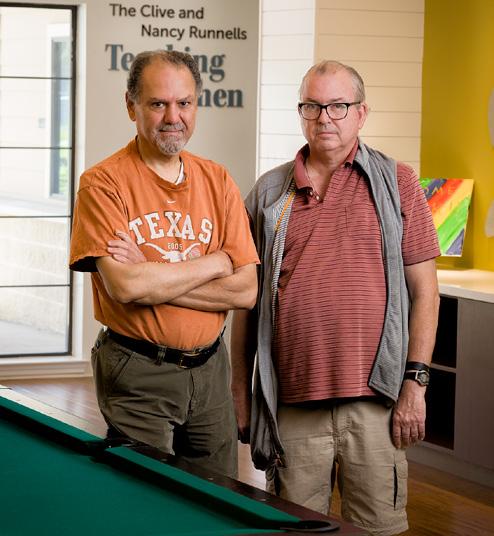
The Gathering Place: Building Community and Empowering Recovery
The Gathering Place is a structured, therapeutic community offered at no charge for adults living with serious and persistent mental illness. Designed to foster personal growth and psychiatric rehabilitation, the program provides a supportive space where members can engage with staff and peers while pursuing individualized goals. We support recovery through connection to community resources, vocational and educational
opportunities, and by encouraging greater independence and psychosocial functioning.
In the wake of the COVID-19 pandemic, participation at The Gathering Place declined significantly. Recognizing the increased need for community and connection, staff launched a peer training specialist program to help members support one another while working toward certification as peer support specialists.
Fifteen members joined the inaugural class in 2024, led by support specialist and mentor Rob Pineda. The training quickly became more than a course—it sparked connection, confidence, and a renewed sense of purpose.
“Each section of the curriculum sparked great conversation,” Pineda recalls. “Members were excited to share their stories and listen to others in a supportive environment.”
One of those members, Marcus J., joined to stay busy—but discovered a deeper calling in helping others. Drawing from his own experience with grief and mental health challenges, Marcus now encourages others with tools like journaling, faith, and therapy. He earned his certification, received an invitation from National Alliance on Mental Health (NAMI) Greater Houston to become a peer educator, and achieved personal milestones, including moving into his own apartment and enrolling in college courses.
Program manager Shalla Parker sees the training as a cornerstone of the clubhouse’s future. “The benefits are clear and significant. With continued funding, we hope to expand certification opportunities and make this program a lasting part of our offerings.”
Thanks to donor support, peer training is helping to rebuild membership at The Gathering Place and creating a vibrant, supportive community where healing is shared and hope is renewed.
Peer support is a cornerstone of recovery. When individuals with lived
Each section of the curriculum sparked great conversation. Members were excited to share their stories and listen to others in a supportive environment.”
— Rob Pineda, Support Specialist
experience walk alongside others facing similar challenges, they offer empathy, validation, and hope in ways that professional care alone cannot replicate. Certified Peer Support Specialists provide unique guidance, helping others find their voice, recognize their achievements, and reduce the stigma around mental
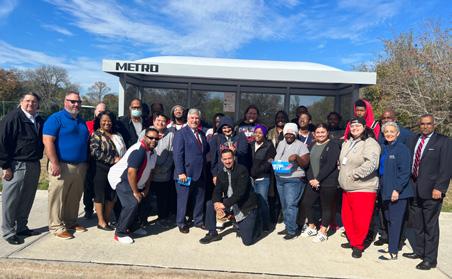
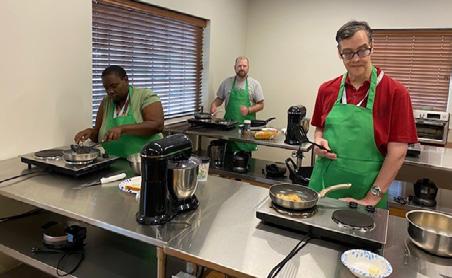

I enjoy being a peer mentor because I get to give to others who feel misunderstood—just like I did.”
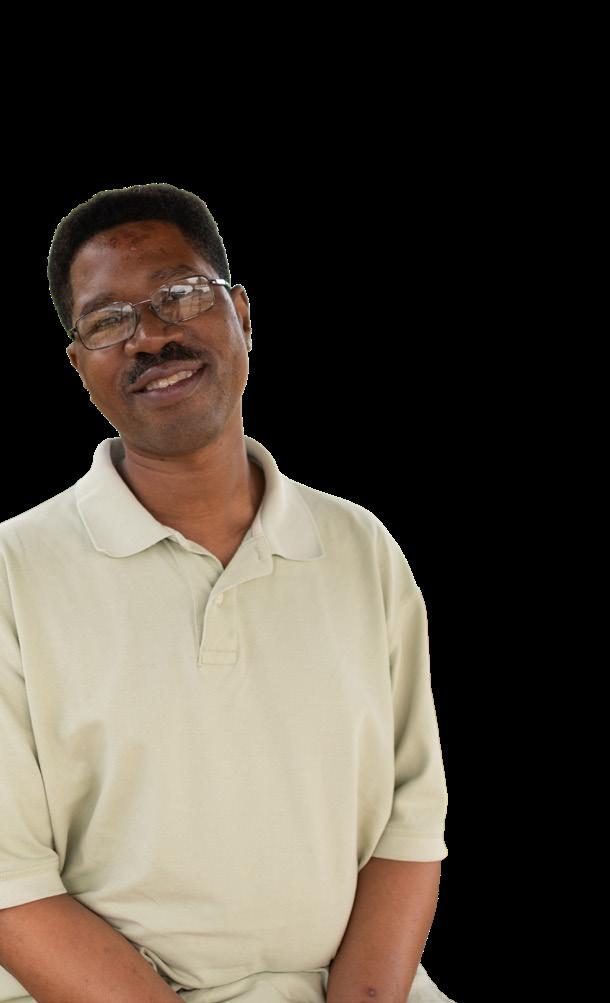
At 46 years old, Marcus has faced more than his share of hardship. Diagnosed with Paranoid Schizophrenia and Obsessive-Compulsive Personality Disorder, he also endured the heartbreaking loss of his entire immediate family—his father, brother, and mother—leaving him without traditional support. In the absence of family, Marcus found a new community at The Gathering Place and his church, both of which have
Marcus made a bold decision about a year ago: he wanted to live independently. With the help of The Gathering Place, he successfully transitioned into affordable housing, a huge milestone in his recovery, and continues to pursue his educational goals at
Marcus also took another courageous step: he earned his certification as a peer mentor. What began as a way to stay busy evolved into a calling. Now invited by NAMI Greater Houston to serve as a peer educator, Marcus uses his lived experiences—including trauma, bullying, and mental health challenges—to support others on their own recovery journeys. He shares tools that have helped him, like journaling, therapy, and his faith, always reinforcing that no one has to go through healing alone.
“I enjoy being a peer mentor because I get to give back to others who feel misunderstood—just like I did,”
His story is a testament to the power of peer support, the value of community, and the strength found in purpose. Marcus’s resilience and generosity embody everything The Gathering Place hopes to inspire in others: growth, healing, and the opportunity to lead meaningful lives.
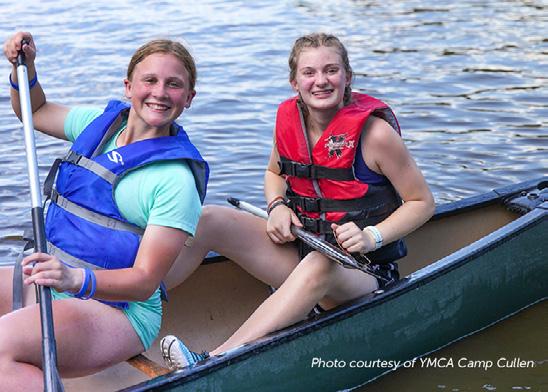
The Menninger Clinic is committed to supporting youth mental health through strong partnerships and community-based initiatives.
We collaborate with local schools, the Greater Houston YMCA, and trusted community organizations to help young people navigate mental health challenges. In 2024 alone, Menninger trained more than 600 YMCA staff members serving in summer camp and after school programs, providing over 5,000 adolescents with informed, supportive care.
At Lamar High School in Houston ISD, we are implementing early identification and intervention strategies to connect students with timely mental health support. Research consistently shows that integrated school-based mental health programs improve safety, attendance, academic achievement, and graduation outcomes,
better equipping students with skills and tools for the future. Clinical staff will integrate validated mental health screenings, build capacity among school staff through professional development, and establish robust care coordination and referral pathways for students requiring follow-up support and/or experiencing struggles with mental health. Through a comprehensive approach, this initiative seeks to address the rising youth mental health crisis by equipping schools to act early, effectively, and compassionately.
We also partner with DePelchin Children’s Center to support youth transitioning out of foster care and into Supervised Independent Living (SIL). Menninger facilitates weekly peer support groups to build community and belonging, while also offering individual therapy to help residents
Suicide is now the second leading cause of death among American youth AGES 15-24
OVER 20% of high school students have had serious thoughts of suicide
1 IN 5 Texas youth experience a mental health condition, yet 60% do not receive treatment
develop the coping skills essential for independent living.
Through these collaborations, Menninger extends its mission beyond the clinic walls—bringing trusted, compassionate mental health care directly into the communities that need it most.
“Early intervention in adolescent mental health isn’t just important—it’s critical. Addressing issues in youth lays the foundation for resilience, healing, and lifelong well-being. But true transformation requires a holistic approach—one that treats the entire family, because a young person cannot thrive in isolation. At The Menninger Clinic, we see success in this approach every day, as families heal together and adolescents are empowered to flourish.”- Armando Colombo, President & CEO, The Menninger Clinic
Emmy Award-winning actor Joe Pantoliano delivered a powerful and deeply personal keynote at the Menninger Clinic’s Annual Signature Luncheon on May 9, moving an audience of 350 supporters with his candid reflections on living with mental illness. The event raised more than $280,000 to support adolescent mental health initiatives—an achievement made possible through
Held at the Hilton Houston Post Oak by the Galleria, the luncheon was chaired by Tejuana Edmond and Jennifer Hanson and honored the Greater Houston YMCA for its continued partnership in delivering mental health support to youth across the region.
During the program, Menninger President and CEO, Armando Colombo, addressed the evolving landscape of mental health care and outlined Menninger’s efforts to expand access, including the acceptance of several major insurance carriers.
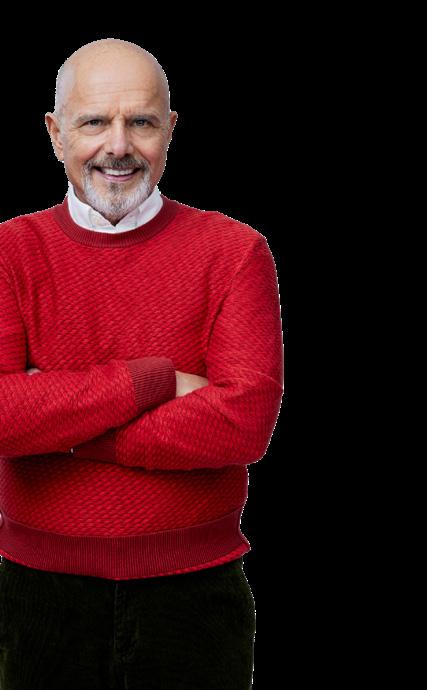
In a compelling conversation with KPRC anchor, Andy Cerota, Pantoliano reflected on his journey with clinical
depression and addiction, despite a successful career and loving family. His decision to seek help and speak openly about his experience has become a message of hope for others, especially young people struggling in silence. “If your life is becoming unmanageable,” he shared, “you have to realize it’s not your fault, and help is there.”
The luncheon’s success is a testament to the power of philanthropy in advancing Menninger’s mission. We are profoundly grateful to our donors whose compassion and commitment make this work possible. Your support is transforming lives and shaping a healthier future for the next generation.
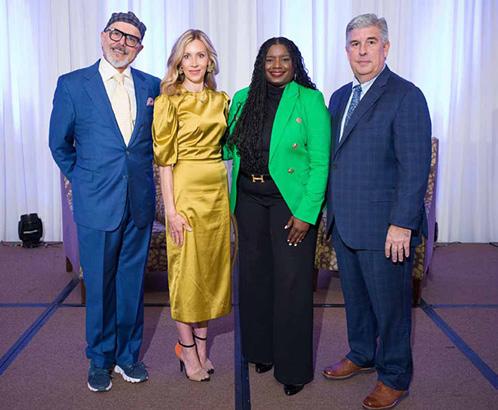
For Kathy Adams, Menninger wasn’t just a name, it was part of the fabric of her childhood. “I can’t remember a time when my father wasn’t flying to Topeka for board meetings,” she recalls. “To me, the word Topeka was synonymous with Menninger.”
Kathy’s father, Thomas B. Adams, was a highly respected Detroit businessman, philanthropist, and Chairman of the global advertising agency Marschalk Campbell-Ewald Worldwide. In 1973, he joined the Menninger Board of Trustees, later becoming a Life Trustee in 1996.
But it was one meeting that shaped his enduring relationship with Menninger—a chance conversation with the legendary Dr. Karl Menninger himself.
That encounter sparked a decades-long commitment to Menninger’s mission. Thomas was so inspired by Dr. Karl’s work that he established Charitable Remainder Trusts (CRTs) for each of his daughters—Janis, Julie, and Kathy which ensure that the family’s legacy of giving would live on.
Today, the Adams Family trusts are transforming lives at The Menninger Clinic.
Through her sisters’ legacy, Kathy has seen the impact of their giving come to life:
• Julie’s trust helped fund the construction of Menninger’s new Center for Addiction Medicine, expanding access to care for those struggling with substance use disorders.
• Janis’ trust is supporting the purchase of a second Transcranial Magnetic Stimulation (TMS) machine, which delivers non-invasive, rapid relief for individuals experiencing depression and suicidal ideation.
• Together, the fund is financing adolescent mental health outreach, to help support two social workers who serve at Lamar High School, the Greater Houston YMCA, and DePelchin Children’s Center.
“It’s incredible to see the work my father started still growing today,” says Kathy. “What he set in motion is helping people who really need it.”
While her father inspired her philanthropic spirit, Kathy credits her mother with shaping her view on mental health care.
“My mom always believed every school should have a counselor that all students talked to regularly, just like seeing the nurse,” Kathy shares. “She hated the stigma that if you saw a counselor, something was ‘wrong’ with you.”
Kathy remembers seeing firsthand how mental illness affected her family’s social circle. “We were lucky in many ways, but some of my parents’ closest friends had children who really struggled. There was a lot of silence, and too many losses to suicide.”
She remembers one childhood friend in particular, a boy she grew up playing with, whose father called Thomas in desperation. “He asked my dad if he could get his son into Menninger,” Kathy says. “That moment stayed with me.”
Now living in California, Kathy honors her family’s legacy by continuing to support Menninger—while also rescuing horses, cats, and dogs on her ranch. She is a champion for mental health, addiction recovery, and the human-animal bond.
“There are a bazillion charities out there,” she says. “But because of my parents, I know how important Menninger’s work is. The research, the care, the compassion. It all matters.”
With gratitude and grace, Kathy continues to carry forward the Adams family commitment: making a difference in the lives of others, one life at a time.
Trauma touches nearly everyone—from survivors of violence, natural disasters, and war, to those impacted by systemic inequality or loss.
The burden is not just emotional; the U.S. spends $27 billion annually on PTSD-related care and disability benefits for veterans alone. Still, between 17 and 44 veterans die each day from suicide or overdose. Many more live silently with invisible wounds.
70% of individuals experience trauma during their lives with up to
86% of high-risk groups, such as veterans or survivors of violence and war, developing PTSD.
Traditional treatments like talk therapy or antidepressants can help, but often fall short. Only one in three patients responds well to the two medications currently approved for the treatment of PTSD. Many find it too emotionally taxing to revisit painful memories in therapy without the right support— which is why dropout rates can exceed 55%.
Since joining The Menninger Clinic as Research Director in November 2024, Lynnette Averill, PhD has made Menninger the home of one of the nation’s most exciting mental health trials—the first state-supported psilocybin-assisted therapy study in the
U.S. aimed at treating combat veterans with PTSD. Backed by Texas House Bill 1802, the study is already showing encouraging results, and Dr. Averill is hopeful it will soon expand to include civilians as well.
Dr. Averill’s work is more than academic. It’s deeply personal. Her father, a Vietnam veteran, died by suicide when she was just three years old. This early loss sparked her lifelong commitment to understanding trauma and, more importantly, helping others recover from it.
“I’ve always wanted to better understand the effects of stress and trauma, how to support those affected, and ultimately, how to save lives,” she shares.
That mission has taken her from research labs to statehouses, where she’s testified on behalf of psychedelicassisted therapy and helped shape legislation like HB1802. She is also a vocal advocate in the national suicide prevention movement, lending her expertise to initiatives in both Connecticut and Illinois.
“We need new tools—ones that work faster, with greater impact, and less emotional cost upfront,” says Dr. Averill.
Derived from certain species of mushroom, psilocybin is administered in capsule form during therapy. It has shown remarkable potential in recent studies for rapid relief of depression, anxiety, and PTSD symptoms, even after just one session.
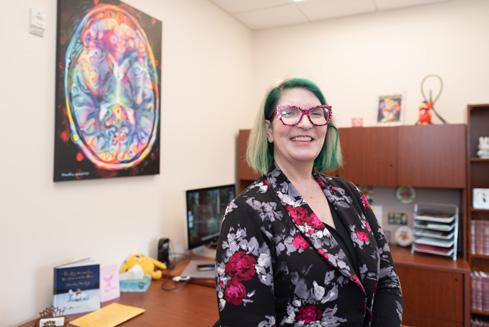
We need new tools—ones that work faster, with greater impact, and less emotional cost upfront.”
— Lynette Averill , PhD
“Unlike traditional antidepressants, psilocybin can promote healthier perspectives and lasting change in just hours,” says Averill. “It helps quiet the brain’s default mode network—that critical inner voice—and create new connections, opening a window for healing.”
Research has shown that brain plasticity—the ability to rewire and adapt—can increase by more than 10% within 24 hours of psilocybin therapy.
Backed by funding from the State of Texas, Menninger launched the STARLIGHT Protocol.
The protocol includes several stages:
• Preparation sessions with therapists to build trust and set intentions
• A monitored dosing session in a specialized, supportive room
• Integration therapy, helping participants apply their experience to daily life
• Follow-up assessments at 1, 3, 6, and 12 months to measure outcomes
So far, the results are promising. Participants report better sleep, reduced feelings of shame, and greater hope, often within a day of treatment. Side effects have been minimal.

“Menninger is uniquely equipped to lead this work,” says Averill. “We have the clinical infrastructure, the research rigor, and the heart to support innovation at the highest level.”
At Menninger, our researchers are dedicated to discovering both the risk and protective factors that influence mental health and turning these insights into effective, evidencebased treatments. Our research teams collaborate with leading scientists nationwide in fields such as brain imaging, genetics, and microbiology to make this translational care possible for patients.
Philanthropic support plays a crucial role in funding early-stage, high-impact research, driving innovation and results to improve lives.
The following are the peer-reviewed publications from the core Menninger Clinic research faculty (Drs. Averill, Mathew, Patriquin, Oh, Salas, and Rufino) for 2024. These are presented in alphabetical order by first author and Menninger Clinic faculty (and associated staff) are in bold.1-34
Agrons, K., Nambi, V., Salas, R., & Minhas, A. M. K. (2024). Suiciderelated mortality in cardiovascular disease in the United States from 1999 to 2019. J Natl Med Assoc, 116(4), 378-389. https://doi. org/10.1016/j.jnma.2024.07.001
Allawala, A., Bijanki, K. R., Oswalt, D., Mathura, R. K., Adkinson, J., Pirtle, V., Shofty, B., Robinson, M., Harrison, M. T., Mathew, S. J., Goodman, W. K., Pouratian, N., Sheth, S. A., & Borton, D. A. (2023). Prefrontal network engagement by deep brain stimulation in limbic hubs. Front Hum Neurosci, 17, 1291315. https://doi.org/10.3389/ fnhum.2023.1291315
Allawala, A. B., Bijanki, K. R., Adkinson, J., Oswalt, D., Tsolaki, E., Mathew, S., Mathura, R. K., Bartoli, E., Provenza, N., Watrous, A. J., Xiao, J., Pirtle, V., Mocchi, M. M., Rajesh, S., Diab, N., Cohn, J. F., Borton, D. A., Goodman, W. K., Pouratian, N., & Sheth, S. A. (2024). Stereo-Electroencephalography-Guided Network Neuromodulation for Psychiatric Disorders: The Neurophysiology Monitoring Unit. Oper Neurosurg (Hagerstown), 27(3), 329-336. https://doi. org/10.1227/ons.0000000000001122
Ambrosi, E., Curtis, K. N., Goli, P., Patriquin, M. A., Arciniegas, D. B., Simonetti, A., Spalletta, G., & Salas, R. (2024). RestingState Functional Connectivity of the Anterior Cingulate Cortex Among Persons With Mood Disorders and Suicidal Behaviors. J Neuropsychiatry Clin Neurosci, 36(2), 143-150. https://doi. org/10.1176/appi.neuropsych.20220203
Armstrong, S. B., Xin, Y., Sepeda, N. D., Polanco, M., Averill, L. A., & Davis, A. K. (2024). Prospective associations of psychedelic treatment for co-occurring alcohol misuse and posttraumatic stress symptoms among United States Special Operations Forces Veterans. Mil Psychol, 36(2), 184-191. https://doi.org/10.1080/08995605.20 22.2156200
Averill, C. L., Averill, L. A., Akiki, T. J., Fouda, S., Krystal, J. H., & Abdallah, C. G. (2024). Findings of PTSD-specific deficits in default mode network strength following a mild experimental stressor. NPP Digit Psychiatry Neurosci, 2(1), 9. https://doi.org/10.1038/s44277024-00011-y
Blanchard, A. W., Rufino, K., & Patriquin, M. A. (2024). Difficulties in emotion regulation moderates the relationship between mood symptoms and nightmares in an inpatient psychiatric sample. J Affect Disord, 351, 179-183. https://doi.org/10.1016/j. jad.2024.01.244
Del Val, C., Díaz de la Guardia-Bolívar, E., Zwir, I., Mishra, P. P., Mesa, A., Salas, R., Poblete, G. F., de Erausquin, G., Raitoharju, E., Kähönen, M., Raitakari, O., Keltikangas-Järvinen, L., Lehtimäki, T., & Cloninger, C. R. (2024). Gene expression networks regulated by human personality. Mol Psychiatry, 29(7), 2241-2260. https://doi. org/10.1038/s41380-024-02484-x
Eken, H. N., Spotts, C., Panny, B., Griffo, A., Degutis, M., Cruz, N., Bell, E., Do-Nguyen, K., Wallace, M. L., Mathew, S. J., Howland, R. H., & Price, R. B. (2024). Improved implicit self-esteem is associated with extended antidepressant effects following a novel synergistic intervention. Mol Psychiatry, 29(11), 3431-3439. https://doi. org/10.1038/s41380-024-02564-y
Hossein, S., Woody, M. L., Panny, B., Spotts, C., Wallace, M. L., Mathew, S. J., Howland, R. H., & Price, R. B. (2025). Functional connectivity subtypes during a positive mood induction: Predicting clinical response in a randomized controlled trial of ketamine for treatment-resistant depression. J Psychopathol Clin Sci, 134(3), 228238. https://doi.org/10.1037/abn0000951
Jha, M. K., Wilkinson, S. T., Krishnan, K., Collins, K. A., Sanacora, G., Murrough, J., Goes, F., Altinay, M., Aloysi, A., Asghar-Ali, A., Barnett, B., Chang, L., Costi, S., Malone, D., Nikayin, S., Nissen, S. E., Ostroff, R., Reti, I., Wolski, K., . . . Mathew, S.J., Anand, A. (2024). Ketamine vs Electroconvulsive Therapy for Treatment-Resistant Depression: A Secondary Analysis of a Randomized Clinical Trial. JAMA Netw Open, 7(6), e2417786. https://doi.org/10.1001/ jamanetworkopen.2024.17786
Kabotyanski, K. E., Najera, R. A., Banks, G. P., Sharma, H., Provenza, N. R., Hayden, B. Y., Mathew, S. J., & Sheth, S. A. (2024). Costeffectiveness and threshold analysis of deep brain stimulation vs. treatment-as-usual for treatment-resistant depression. Transl Psychiatry, 14(1), 243. https://doi.org/10.1038/s41398-024-02951-7
Karp, J. F., Brinton, R. D., Fournier, J. C., Harding, L., Jha, M. K., Lenze, E. J., Mathew, S. J., Meltzer-Brody, S., Mohr, D. C., Riva-Posse, P., Wiechers, I., & Williams, N. R. (2024). Difficult to Treat Depression: Focus on Approach, Algorithms, and Access. J Clin Psychiatry, 85(4). https://doi.org/10.4088/JCP.psprmdd2408ah
Lin, C. R., Yonce, S. S., Pacini, N. J., Yu, M. M., Bishop, J. S., Pavlik, V. N., & Salas, R. (2024). Cerebello-Parietal Functional Connectivity in Amnestic Mild Cognitive Impairment. J Alzheimers Dis, 100(3), 775-782. https://doi.org/10.3233/jad-240368
Myers, J., Xiao, J., Mathura, R., Shofty, B., Pirtle, V., Adkinson, J., Allawala, A. B., Anand, A., Gadot, R., Najera, R., Rey, H. G., Mathew, S. J., Bijanki, K., Banks, G., Watrous, A., Bartoli, E., Heilbronner, S. R., Provenza, N., Goodman, W. K., . . . Sheth, S. A. (2024). Intracranial Directed Connectivity Links Subregions of the Prefrontal Cortex to Major Depression. medRxiv. https://doi.org/10.1101/2024.08.07.24 311546
Myerson, J., Montelongo, M., Rufino, K., Patriquin, M., Salas, R., & Oh, H. (2024). Examination of reward processing dysfunctions in the left dorsal striatum and other brain regions among psychiatric inpatients with substance use. Drug Alcohol Depend, 256, 111097. https://doi.org/10.1016/j.drugalcdep.2024.111097
Neitzke-Spruill, L., Beit, C., Averill, L. A., & McGuire, A. L. (2025). Supportive Touch in Psychedelic Assisted Therapy. Am J Bioeth, 25(1), 29-39. https://doi.org/10.1080/15265161.2024.2433428
Neitzke-Spruill, L., Devenot, N., Sisti, D., Averill, L. A., & McGuire, A. L. (2024). Bio-Psycho-Spiritual Perspectives on Psychedelics: Clinical and Ethical Implications. Perspect Biol Med, 67(1), 117-142. https://doi.org/10.1353/pbm.2024.a919715
O’Brien, B., Lee, J., Kim, S., Nandra, G. S., Pannu, P., Tamman, A., Amarneh, D., Swann, A. C., Murphy, N., Averill, L., Jha, M., & Mathew, S. J. (2024). Anti-suicidal effects of IV ketamine in a realworld setting. Psychiatry Res, 331, 115604. https://doi.org/10.1016/j. psychres.2023.115604
O’Leary, K. B., Rufino, K. A., Patriquin, M. A., & Kapoor, S. (2024). Gender Identity and Mental Health Symptom Severity Among Adolescents Admitted to an Inpatient Psychiatric Hospital. Child Psychiatry Hum Dev. https://doi.org/10.1007/s10578-024-01674-6
Papakostas, G. I., Trivedi, M. H., Shelton, R. C., Iosifescu, D. V., Thase, M. E., Jha, M. K., Mathew, S. J., DeBattista, C., Dokucu, M. E., Brawman-Mintzer, O., Currier, G. W., McCall, W. V., Modirrousta, M., Macaluso, M., Bystritsky, A., Rodriguez, F. V., Nelson, E. B., Yeung, A. S., Feeney, A., . . . Fava, M. (2024). Comparative effectiveness research trial for antidepressant incomplete and non-responders with treatment resistant depression (ASCERTAIN-TRD) a randomized clinical trial. Mol Psychiatry, 29(8), 2287-2295. https:// doi.org/10.1038/s41380-024-02468-x
Parikh, S. V., Aaronson, S. T., Mathew, S. J., Alva, G., DeBattista, C., Kanes, S., Lasser, R., Bullock, A., Kotecha, M., Jung, J., Forrestal, F., Jonas, J., Vera, T., Leclair, B., & Doherty, J. (2024). Efficacy and safety of zuranolone co-initiated with an antidepressant in adults with major depressive disorder: results from the phase 3 CORAL study. Neuropsychopharmacology, 49(2), 467-475. https://doi.org/10.1038/ s41386-023-01751-9
Ramirez, J. C., Buissonnière-Ariza, V., McIngvale, E., Rufino, K. A., Puryear, L. J., Treece, C. A., Schneider, S. C., Cepeda, S. L., Goodman, W. K., & Storch, E. A. (2024). Perceived worsening of obsessivecompulsive disorder symptoms after childbirth in women and men: An understudied phenomenon. Bull Menninger Clin, 88(1), 48-60. https://doi.org/10.1521/bumc.2024.88.1.48
Reddy, S., Kabotyanski, K. E., Hirani, S., Liu, T., Naqvi, Z., Giridharan, N., Hasen, M., Provenza, N. R., Banks, G. P., Mathew, S. J., Goodman, W. K., & Sheth, S. A. (2024). Efficacy of Deep Brain Stimulation for Treatment-Resistant Depression: Systematic Review and MetaAnalysis. Biol Psychiatry Cogn Neurosci Neuroimaging, 9(12), 12391248. https://doi.org/10.1016/j.bpsc.2024.08.013
Rengasamy, M., Mathew, S., Howland, R., Griffo, A., Panny, B., & Price, R. (2024). Neural connectivity moderators and mechanisms of ketamine treatment among treatment-resistant depressed patients: a randomized controlled trial. EBioMedicine, 99, 104902. https://doi.org/10.1016/j.ebiom.2023.104902
Rufino, K. A., Bolstad, C. J., Worley, C. B., Patriquin, M. A., & Nadorff, M. R. (2024). Factor Analysis and Validation of the Disturbing Dream and Nightmare Severity Index in an Inpatient Sample. Behav Sleep Med, 22(4), 540-552. https://doi.org/10.1080/1 5402002.2024.2319835
Schatzberg, A. F., & Mathew, S. J. (2024). The why, when, where, how, and so what of so-called rapidly acting antidepressants. Neuropsychopharmacology, 49(1), 189-196. https://doi.org/10.1038/ s41386-023-01647-8
Swanberg, K. M., Prinsen, H., Averill, C. L., Campos, L., Kurada, A. V., Krystal, J. H., Petrakis, I. L., Averill, L. A., Rothman, D. L., Abdallah, C. G., & Juchem, C. (2024). Medial prefrontal cortex neurotransmitter abnormalities in posttraumatic stress disorder with and without comorbidity to major depression. NMR Biomed, 37(11), e5220. https://doi.org/10.1002/nbm.5220
Wang, I. C., Buffington, S. A., & Salas, R. (2024). Microbiota-GutBrain Axis in Psychiatry: Focus on Depressive Disorders. Curr Epidemiol Rep, 11(4), 222-232. https://doi.org/10.1007/s40471-02400349-z
Westheimer, J. L., Smith, R. P., Iacobelli, P., Oh, H., Tezino, L., Khan, R., Broussard, J., Meltzer, G., Obeid, N., Cunningham, S., Boland, R. J., & Patriquin, M. A. (2024). The state of (mis) trust: Human-centered technology development & implementation in intensive mental health settings. J Affect Disord, 367, 318-323. https://doi.org/10.1016/j.jad.2024.08.206
Xiao, J., Adkinson, J. A., Allawala, A. B., Banks, G., Bartoli, E., Fan, X., Mocchi, M., Pascuzzi, B., Pulapaka, S., Franch, M. C., Mathew, S. J., Mathura, R. K., Myers, J., Pirtle, V., Provenza, N. R., Shofty, B., Watrous, A. J., Pitkow, X., Goodman, W. K., . . . Hayden, B. Y. (2024). Insula uses overlapping codes for emotion in self and others. bioRxiv. https://doi.org/10.1101/2024.06.04.596966
Xiao, J., Adkinson, J. A., Myers, J., Allawala, A. B., Mathura, R. K., Pirtle, V., Najera, R., Provenza, N. R., Bartoli, E., Watrous, A. J., Oswalt, D., Gadot, R., Anand, A., Shofty, B., Mathew, S. J., Goodman, W. K., Pouratian, N., Pitkow, X., Bijanki, K. R., . . . Sheth, S. A. (2024). Beta activity in human anterior cingulate cortex mediates reward biases. Nat Commun, 15(1), 5528. https://doi.org/10.1038/s41467-02449600-7
THE MENNINGER CLINIC
Ronald P. Cuenod, Jr. BOARD CHAIR Houston, TX
Alan I. Abramson Beverly Hills, CA
Paul B. Beck Houston, TX
Stacy L. Ellington Houston, TX
Kathy C. Flanagan, MD Houston, TX
Pamela K. Greene, PhD, RN Corpus Christi, TX
Harvey Kurzweil New York, NY
Walt Menninger, MD Topeka, KS
Genevieve O’Sullivan Houston, TX
Ned Schwing Houston, TX
Huda Zoghbi, MD Houston, TX
John McKelvey* DIRECTOR EMERITUS, EX OFFICIO Leawood, KS
Norman C. Schultz* DIRECTOR EMERITUS, EX OFFICIO Indian Wells, CA
Rob C. Wilson III* DIRECTOR EMERITUS, EX OFFICIO Houston, TX
*Ex Officio
THE MENNINGER CLINIC FOUNDATION
Ronald P. Cuenod, Jr. INTERIM BOARD CHAIR Houston, TX
Elise Banks-Lovely Houston, TX
Nancy J. Corbet Houston, TX
Milby Dow Dunn II Houston, TX
Tejuana Edmond Houston, TX
Michael U. Ellington, Jr. Houston, TX
Elaine W. Finger Houston, TX
David E. K. Frischkorn, Jr. Houston, TX
Jennifer Hanson Houston, TX
Mandy J. Hill, DrPH, MPH Houston, TX
F. Allen Lyons Houston, TX
John Menninger, MD Denver, CO
Susie Peake Houston, TX
Rev. Dr. Douglas Richnow Houston, TX
Judson W. Robinson III Houston, TX
Orgena L. Singleton Houston, TX
Nicole C. West, EdD Houston, TX
The Menninger Clinic and The Menninger Clinic Foundation Fiscal Year January 1, 2024 – December 31, 2024
Your generosity and partnership have made a profound difference in the lives of individuals and families facing mental health challenges. Because of you, hope and healing are within reach for more people than ever before.
In 2024, your support funded critical initiatives and programs—from expanding adolescent mental health programs in our community to enhancing patient care, advancing research, and growing professional training for the next generation of mental health leaders. Philanthropy remains at the heart of The Menninger Clinic’s mission, enabling us to extend our reach far beyond our hospital walls.
Our list of donors reflects more than financial support. It celebrates a shared commitment to mental wellness, the fight against stigma, and the creation of a healthier, more compassionate future. We are deeply grateful for your trust and partnership. Thank you for being part of this important work.
Donor Honor Roll (as of December 31, 2024)
$100,000+
Estate of Janis E. Adams
M. D. Anderson Foundation
The Hamill Foundation
Melanie & Mark S. Klotzman
Stedman West Foundation
$25,000+
The Ellwood Foundation
Marvy Finger Family Foundation
Fraternal Order of Eagles
Gwen & Gary Gilmer
Linda & John Griffin
The Henderson-Wessendorff Foundation
C. James & Carole Walter Looke
Family / Walter Oil & Gas Corporation
Ruth Jones MacDonald Charitable Trust
The W.T. & Louise J. Moran Foundation
Michael Schinagel
Janet. & Joseph Stinus
Wacker Family Fund of The Dallas Foundation
$10,000+
Alan I. Abramson Anonymous
William J. Beard and R. Jean Beard Trusts
Marrs McLean Bowman
The Brown Foundation, Inc.
The Gordon A. Cain Foundation
Collins Holding Company
Lisa & Armando Colombo
Cuenod Families
Sadie Danciger Trust
George and Mary Josephine
Hamman Foundation
The Hood-Barrow Foundation
InduMar Products, Inc.
Carl Jacobs Foundation
William C. Madlener†
Massey Family Charitable Lead
Annuity Trust
Poppi Georges Massey (The Massey Family)
Reuben B. & Helga M. Resnik Foundation
Dr. Scholl Foundation
Cherida Collins Smith
Strake Foundation
Jack Taylor Family Foundation
$5,000+
Joan & Stanford
Alexander Family Anonymous BASF
Bracewell
Briar Hollow Foundation
The Cord Foundation Trust
The Crain Foundation / Lacy
Crain & Joe Galloway
Nancy G. Dickenson
Dobrowski Stafford & Pierce LLP
Driftwood Recovery
Tejuana L. Edmond
Julie & Michael Etringer
Kathy C. Flanagan, MD
Jennifer & Michael Hanson
Sandi & Bob Harris
Lucile W. Hays
HEB Grocery Company, L.P.
J Squared Family Foundation
Annette & Mel Klein
Letty Knapp
Barbara & Harvey Kurzweil
Elizabeth Y. Leckenby†
Eugenia D. Magafan
Marek Brothers
Dessi & Sanjay Mathew
John P. McGovern Foundation
Margie & Jerry Noll
Northern Trust
Vivie & Chris O’Sullivan
Paula & Jeff Paine
Liz & Ned Schwing
Suzanne & Tad M. Smith
Paula Sutton
Texas Children’s
Ann G. Trammell
Irene & David Waddill
Nevine & Aaron Webster
Zinn Petroleum Company
$1,000+
Edward Ackerman
Marian Menninger Adams, MD
Anonymous
Nancy D. Baker, MD
Carol & Paul Beck
Barbara & Donald H. Bernstein
Block Family
Patricia Gail Bray & Stephen
Linder
The Church of St. John the Divine
Columbia Lloyds Insurance Company
The Conner Foundation
The Reverend Margaret G. Crandall
Julia & Clay Crawford
The Dau Family Foundation/
Ann & Elliot S. Conway
Elizabeth David, MD
Patricia Doemer
Krista & Michael Dumas
Laura A. Easton
Carl W. Eberbach and Elisabeth
Falk Eberbach Fund
Anette T. Edens & Steve Irving
Stacy & Michael Ellington
Melissa & Nicholas Erwin
Elaine Finger
Anne & David Frischkorn
Diana Garza & Peter McLauglin
Pam & Van Greene
The Heffner Fund
Houston Area Urban League
Houston (TX) Chapter of The Links, Incorporated
Kristin Johnson
Justice Forward Houston
Shelley Kaplan
Carolyn Dineen King
Kovler Family Foundation
Barbara & Jim Leeton
Diana MacArthur
April & Wells McGee
W. Walter Menninger, MD
Brent Morse
Richard Nightingale, MD
Elaine &Paul Plummer
Katina Pontikes & Monty
McDannald
Kathleen & Townes Pressler
Kellye & Bill Pyle
Cayce A. Ranton
Gretchen & Robert B. Ravenscroft
Macey & Harry Reasoner
Reynaldo Reza
Regina Rogers
Wendy & Derry Seldin
St. Francis Episcopal Church
Diana Strassmann & Jeff Smisek
Jane & Robert Sturgeon
Tellepsen Builders
Charles G. Tracy
Linda Powers Tulp & Peter Tulp
Tracie Walker-Kirkland
Jean & Dennis M. Wilson
YMCA Greater Houston
$999 and Below
Michael J. Adam III
Warren R. Allen
David G. Alt
Ana & Miguel E. Amaro
Linda Amerson
Devon Anderson
Justin Anderson
Justice Karen Angelini
Anonymous
Katherine & James C. Arcidiacono
Reverend Jeffery S. Atwater
Lynnette A. Averill Ph.D.
Nina Aversa
Mercy Babo
Susan & James A. Baker III
Jo Anne Balthazor
Peggy & Gary Balzhiser
Elise N. Banks-Lovely
Summerlynne Bartlett-Moore & Frank Moore
Joan & Richard Beach
Mary Beck
Juan Carlos Belalcazar Canal
Dr. Christine D. Bell
Lenore & Howard L. Bernstein
Chris Bishop
Berta & James Blecke
Claudia & Robert Bluhm
Robert J. Boland, MD
Dianne Bolen
Barb & Carl de Borhegyi
Judith Bowditch
Judith M. Bowen, MD & Stephen F. Kowalski, MD
Tanya Bradley-Doubarere
Tracy & John R. Bragg
Mikayla Brama
Agatha & Erich J. Brann
Bree Brown
Bettye M. Brubaker
Barbara J. Burris
Dalanna Burris
Dr. Alan K. Caldwell
Sarikka A. Campbell
Willo Carey & Peter A. Benoliel
Jennie & Emmett Carroll Family
Rebecca T. Carrum
Elizabeth W. Carswell
Lisa M. Caruthers, MSW, PhD
Letty Casazza
Elizabeth Castrellon
Constance Catalfio
Emma Chambers
Rosetta & Robert Y. Chao
Maria Il-Cha Choe, MD
Hayley Citro
Bethany Clarkson-Morgan
Jen Clement
The Reverend Ronald L. Cobb
and Kathleen Cobb
Nancy J. Corbet
Shauna B. Corbin, PhD
Shirley Coster
Susan H. Coulter
Mary Covington
Charlotte Crawford
Toni Crawford
Cheryl Creuzot
Kathryn Crumbaugh
Stephanie & Keith Cunningham
Eva Curtis
Thomas C. Dabney
Ron Dancy
Paul O. Daugherty, Jr.
Rebecca & Dale A. Davenport
Janet E. Davis
David M. Davis, MD
Nova Davis-Hailey
Patricia Daza, PhD, ABPP
Susanna & George T. De Cecco
Laura & David G. De Roo
Hollis Deatherage
Brian DeGrado
Chaplain Salvador R.
Del Mundo
Kathleen M. Dennish
Alice Dillon
Amanda Dinitz
BinhPhuong Do
Jay V. Dolcetti
Karen & Frank Donnelly
Jackie & Fred Dunlop
Milby Dunn
Tamy & Pat Dyer
Jean A. Eames
Tanya Easter
Jami Eckols-Leonard
Ramsay Elder
Sally J. Erbe
Marina Erbstoesser
Cecelia M. Esquivel
Stefanie Etienne
Tammy Evans
Susan S. Falgout
Blair Famarin
Diontha Fancher
Robert S. Fay
Ellen M. Feldman
Priscilla & Donald K. Felt
Stacie L. Fillyaw
Susan Fitzpatricks
Lissa Flores-Flowers & Jim
Flowers
Doe & Henry Florsheim
Reagan Flowers
Alice & Christopher F. Flynn
Pamela W. Foley & L. Michael
Foley
Sarah & Douglas L. Foshee
Kimberly Foster
Charlotte A. Fostey
Eileen & Jeff Fostey
The Fox Wiviott Family
Elaine Franco
Elizabeth Franzen
Laurence D. Fry, MBA
Lisa Fulenwider
Melanie & Gregory Gehrt
Marla & Larry Gilbert
Phelica Glass
The Glidewell Family
Liz & Pat Golmon
John E. Gomolka
Juan Alon Gonzalez
Rosa & Alonzo Gonzalez
Raquel Gonzalez
Virginia & Timothy L. Goodwin
Lainie Gordon & David
Mincberg
Rebekah Grohn
Dorothy & Michael E. Grom
Jennifer Grosvenor
Thomas & Elizabeth Grubaugh
Rosemary & Jim Hachey
William R. Hale, MD
Billie Hall
Toy Halsey
Kathyrn & James C. Hardin III
Robin & Bradford Haroian
Ann M. Harrington
Catherine Hart
Katy & Clyde Hayes
Sandra & Gregory S. Hays
Mary & William D. Helms
Margaret & Andrew Herdeg
Sharon & Paul D. Hermann
Mandy J. Hill, DrPh, MPH
Robert Hilliker & Will Davis /
Ethos Behavioral Health Group
Shawn Hirsch, PhD
Bill Hoag
William W. Hodges
Tina Holmes
Carl & Mary Holvik
Elizabeth Hornberger
Don Horner
Kerry Horrell, PhD
Judith M. Horton-Holm
Mary & Bill Hughes
Diane S. Humphrey
Greg Jacobs
Carolyn Jakopin
William O. Jameson
Jennifer Jewson
Don & Virginia Johnson
Jacquelyn M. Johnson
James Jones
Laura Lee Jones
Rachel Jones
Lois Jordan, LCSW
Sharon & Richard Jordan
Constance & V. Stewart Jose
Paula L. Judkins
Leslie & Tom Karr
Elaine & Timothy W. Kehoe
Elizabeth Kelati, LPC-A
Raheela Khan
Anne King
Arthur Klebanoff & Susan Hirschhorn
Russell R. Knott
Frank R. Knox
Marian Kohlstedt
Angela A. Koreth
Sandra Kortesoja
Colleen Kramer
Kroger Company
Geraldine S. Kunstadter
Beth Kushner
Carla B. Lakier
Maurice M. Langston, Jr.
Sharon Lasman
Robbie & Lawrence Lacy
Leslie & Lewis A. Levey
Gail & Warren Lieberfarb
Jeri Lilly
Adrian Lira, PhD, LPC-S
Casey Livarchik
Steven J. Livengood
Margene W. Lloyd
Klinka Lollar
Jim & Nancy Lomax
Jayne M. Look
Luna Recovery Services
Anne Lupton
Mark Luzbetak
Kate & Jim Lykes
Carol Lee & Allen Lyons
Barbara & Stephen Lyrene
M.A.D. Marketing
Walter Magreta
Lisa Malcy, LCSW, MSW
Patricia A. Malloy
Alejandra & Anuron Mandal
Ellen B. Marchand
Laurie & Paul Marino
Sue V. Massoth, MD
Johanna & Douglas R. Mathera
Mariane Maximous
Suzy McElroy
Patricia McFarlen
Barbara & R. Craig McKee
Corra & Stewart McKnight
Mary Ellen McLenighan
Joan D. McLeod
James & Julie McNeil
The McReynolds Family Foundation, Inc.
Joyce K. McWilliams
Mrs. Comer V. Meadows
Clair Zilber, MD & John A. Menninger, MD
Allison & William
L. Menninger, MD
Michael Menninger, MD
Christi Meyer
Kent B. Mickelson
Lucy H. Molinaro
Jim & Carol Moller
Peggy & Dick Mong
Karon & Kirk A. Mooney
Brenda A. Moran
Megan Morcomb MSW, LCSW-S
Dennis B. Morgan, MD
Mattie Morris
Marion & Philip J. Mudd
Adrienne & Richard Munich
Ruth & Michael F. Murphy
Ruby Murray
Gigi Myung
Chanchal & Hira Narang
Tracy Naylor
May Ngo
Angelica Nguyen
Mary Noack
Karen & Bobbitt Noel
Patrice Noel
Karen P. Oldham, MD & John M. Oldham, MD
Orchard Mental Health Group
Anissa & Adam Orr
Dr. Susan Snider Osterberg
Lynne & David E. Ostrow, MD
Mary C. Oxford, PhD
Vicky & John Ramuta
Geralene Randolph
Marilyn E. Ratner
Jennifer Reed
James A. Reeder, Jr.
Stephanie M. Reeves
Natalie Reichman
Linda M. Reitzenstein
Julia Ridgeway-Diaz
Joe & Laura Rigano
Mychal Riley
Bridgett Rivet
Monica Roberts
Annette R. Roiphe
Patrick Ronan
Sonia M. Roschelli, LCSW-S, LCDC
Mary Rose PsyD, DBSM, CBSM
Sherrell Rucker
Katrina A. Rufino, PhD
Rusk Family
Ellen J. Safier, LCSW & Efrain
Bleiberg, MD
Danielle Sandow
Jane & Enrique Van Santen
Dorothy Saxe
Kirsten C. Schachter
Allison Schaefer
Jolene & George Schlatter
David Schminke II
Judith & Paul Schwartz
Sharon & John Schwille
Kimberly S. Scott
Ali Seifi
Veronica Sevilla
John Q. Sexton
Barbara L. Seymour
Maheen Shahzad
Pearce Henry Shanks, Jr.
Hilary Sherry, PhD
Daryl Shorter MD
Ellen & Dennis L. Slan
Bristol-Myers Squibb Foundation, Inc.
John Stadler
Richard Stadler
Lou Ellen Stansell
John & Judy Steele
Lias Jeffrey Steen
Drew Stewart
Shari Stewart
Danielle Stillman
Doris H. Strong
Maryann Sullivan
Karen Susman
Paula & Barry J. Sutcliffe
Susan P. Swartz
Alice Szigethy
Brenda Taylor
Jeanette & Marc D. Taylor
Marcus J. Taylor
Ean Choo Mary Ann Tham
Barbara & Thomas H. Adams
Julia F. Thompson, Inc.
Katherine Thornton
Adarsh & Ranvir K. Trehan
Ruth A. Trivers-Mekitarian
Nancy Trowbridge
Sharlie Velasco
Jennifer Velasquez
Nicole Walters
Judith & David C. Ward
Susan & Douglas Warsett
Kethia Webber
Serena Weber, MD
Samuel Weinstein Family Foundation
Laura E. Welch
Jennifer Weston
Mark A. White
Queenie Wilkins
Margarett M. Williams
Wanda Williams
Barbara & Robert Wilson
Elizabeth A. Witt, PhD
Anita & Larry E. Wolgast
Deborah & Durf Wood
Rebecca A. Wood
Margaret Wright
Judith Wuntch
Erica Wyatt
Hillary Wylie
Rose Yang, PsyD
Jake Yarbrough
Donald Yurewicz & Theresa Einhorn
Norman A. Zilber, Esq.
Huda Y. Zoghbi, MD
The Heritage Society honors individuals who have made a lasting commitment to mental health by including The Menninger Clinic in their estate plans. Through their planned gifts, these generous donors are helping to ensure that future generations have access to compassionate, evidence-based mental health care. We are deeply grateful for their vision and dedication.
Heritage Society Members (as of December 31, 2024)
Alan I. Abramson
Mary & William R. Anderson, Jr.
Anonymous
Jeffery S. Atwater, DMin
James A. Baker
Michael G. Barrett
Carolyn J. Bunker
F. Robert Burrows
Reverend Willem C. Bynagte &
Mrs. Jacquelin L. Bynagte
Agatha L. Calkins†
Letty Casazza
Herbert Cattenberg
Joan Cavally
Maria Il-Cha Choe, MD
Mary J. Clements
Nancy J. Corbet & Charles S. Willits
The Reverend
Margaret G. Crandall
Dr. Ermaleen B. & Owen B. Etter
Robert S. Fay
Barbara R. Furlow
Dr. Carl W. Eberbach & Elisabeth Falk Eberbach Fund
Bruno & Margaret Jonikas & Family
Dr. Phyllis A. Kempner
& Dr. David D. Stein
Sylvia & Matt Kerrigan
Marcia & Robert J. Lippold
Lydia Luz
Edward Macauley IV
Richard M. Menninger
Adam C. Moorhead
Dennis B. Morgan
Lori & John C. Moser
Miriam & Lawrence Movsovitz
Manoj K. Narang
Charles T. Nevels, MD
Linda K. Norman &
Robert D. Ryan
Eleanor M. O’Neill
Roberta Ossi
Katina C. Pontikes & Monty McDannald, Jr.
Marilyn E. Ratner
Janice S. Roberts
Pamela & John W. Roeth
Dorothy Saxe
Marilyn G. & Robert C. Schnitz
Frederick D. Schroth
Wendy & Derry Seldin
Elaine Shapiro, MSW, BCD
Arline R. Siegel
Stephen B. Sofro
Gale Steinberg
Alfred P. Stern
Charlotte† & Donald Test, Jr.
Ann G. Trammell
Betty Vincent-Karl & Christian Karl
Margarett M. Williams
Lynn & August R. Woods, Jr.
Gifts made in honor or memory of a loved one are a meaningful way to celebrate life, recognize milestones, or pay tribute to someone’s legacy. We are honored to recognize the following individuals whose names were commemorated through generous contributions to The Menninger Clinic.
In Honor Of
Richard Allison by Joan & Richard A. Beach
Tyler Burnett by Margaret & Andrew Herdeg
Rachel Carlock by Liz & Joe Powers
Armando Colombo by Barbara & Ronald P. Cuenod
William Cormicle by Frank R. Knox
Morgan Cuenod by Kathleen & Townes Pressler
Ronald Cuenod by Lias Jeffrey Steen
Tejuana Edmond by Mattie Morris, Theresa Einhorn, Donald Yurewicz
Richard Eisenberg by Margarett M. Williams
Severo Esquivel by Cecelia M. Esquivel
Elaine Finger by Amanda Dinitz
Kathy Flanagan by Doe & Henry Florsheim
Charlotte Fostey by Eileen & Jeff Fostey, Lissa Flores-Flowers & Jim Flowers
John Gartner by Judith M. Horton-Holm
Sara J. Aversa by Leslie & Tom Karr
Colleen Kramer
Barb & Carl de Borhegyi
Judith Bowditch
Rosemary & Jim Hachey
Mark Luzbetak
David Schminke II
John Stadler & Jim Green
Richard Stadler
Marla and Larry Gilbert
Judy & Dave Ward
Nina Aversa
Patricia A. Malloy
Vicki & John Ramuta
Stephanie M. Reeves
Marcus J. Taylor
Kathryn Crumbaugh
Emmett Carroll
Beth Kushner
Mary Ellen McLenighan
Catherine Hart
Brian DeGrado
Megan Balzhiser by Peggy & Gary Balzhiser
Eileen Brockleman by Mary C. Oxford
Jerry Burris by Barbara J. Burris
Ruth Carey by Don Horner
Reginald Dawson by Tanya Bradley-Doubarere
Linda & John Griffin by Tami & Pat Dyer
Jennifer Hanson by Susan H. Coulter, Natalie Reichman
Jennifer Jameson by William Jameson
Lois Jordon by Eddie Ackerman
Katherine F. Lykes by Susan S. Falgout, Robert Hilliker, Will Davis, Ethos Behavioral Health Group
Suzy McElroy by Suzy McElroy
Peter McKee by Barbara & R. Craig McKee
Megan Mong by Peggy & Dick Mong
Nancy Paylo by Cynthia I. Mulder, LCSW
Barbara & Corbin Robertson by Jackie & Fred Dunlop
Miriam Wasson by Rachel Jones
Robert Wilson by Lainie Gordon & David Mincberg
Stuart & Beth Yudofsky, MD by Dessi & Sanjay Mathew
Leonard Eames by Jean A. Eames
Kristy Erbe by Sally J. Erbe
Nona Fain by Anne Lupton
Vincent Foley by Ann M. Harrington
Connie Glenn Fillyaw by Stacie L. Fillyaw
Norma Green by Nancy G. Dickenson
Rev. David Jaskierny by Elizabeth Witt
Jacqueline Anne Klein by Annette & Mel Klein
Christine Kohlstedt by Marian B. Kohlstedt
Stewart Lang by Drew Stewart
Sophie Magafan by Eugenia & Antonis Stubos
Peter Mark by Charles Mohan
Dorothy B. Bandy Melton by Maurice Langston
Harriet Valentine Menninger by Bettye M. Brubaker
Roy Menninger by Alison & William L. Menninger
Kermont B. Mickelson by Kent B. Mickelson
Megan Mong by Peggy & Dick Mong
W.T. and Louise J. Moran by The W.T. & Louise J. Moran Foundation
John O’Sullivan by Poppi Georges Massey
Michael Prince by Nancy Corbet
Caleb Pursley by Shannon Pursley & Sharon Pursley
Dennis Sbach by Laura Lee Jones
Gloria Schachter by Linda Reitzenstein
Steven Skiff by Susan Fitzpatrick
Dr. Emory Sobiesk by Pam & Van Greene
Sawyer Updike by Gigi Myung
We make every effort to recognize our donors accurately and with gratitude. If you notice an error or would prefer to be acknowledged differently, please contact Ashleigh Hughes, Vice President of Philanthropy and Chief Development Officer, at ahughes@menninger.edu. † deceased
